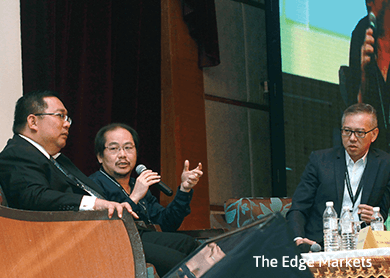
KUALA LUMPUR: The ringgit would be stronger than it is currently if not for the “trust deficit” that has caused the outflow of capital. This was the view of The Edge Media Group executive chairman Datuk Tong Kooi Ong, who said the value of the ringgit should be stronger based on Malaysia’s economic fundamentals.
Speaking at an investment forum organised by Affin Hwang Asset Management Bhd on Saturday, Tong said more Malaysians than foreigners are sending money out to invest because the trust deficit at home has affected confidence.
“There is a trust deficit, and the goods and services tax has clearly affected consumer spending,” he said. “Sentiments are down and private investment is soft.”
Tong expects the ringgit to remain weak for the rest of the year. Furthermore, the strengthening US dollar will accelerate the depreciation of the ringgit further.
“There’s no silver lining. The ringgit is down substantially as compared with Thailand, Indonesia and the Philippines [against the US dollar].
“This is on the back of the high level of foreign holdings in the Malaysian bond market,” Tong said.
As the worst performing currency in Asia this year, the ringgit has declined to the weakest level in more than five years, and this does not help the country’s exports, Tong said. The ringgit slipped to 3.75 against the greenback last Friday.
Comparing our April trade figures with other Southeast Asian countries, Tong noted that exports sank 8.8% year-on-year, while the exports of Thailand and the Philippines were up 187% and 22% respectively. He also noted that there was a decline in the current account and the country’s reserves.
Nonetheless, one saving grace is the abundant savings in the institutional and private sectors, Tong pointed out, that would help cushion any shock on the economy.
Tong observered that local institutions had directed money away from the bond market into the equity market, which caused an excessive valuation in the stock market.
“But what we’ve seen today is the unwinding of those positions,” said Tong, explaining the current weak market conditions.
On a more positive note, Tong said despite the expectation of a tough economic environment, there are pockets of opportunities to be found based on tools and data analytics.
Tong advised investors to be more disciplined and selective in their stock picks in order to perform well in a challenging market.

On the property market, Tong said the decline in property prices will become prominent in 2015 and 2016. “While property prices might be holding up, you can see that the actual number of the transactions in the property market has gone down tremendously. When prices go up but the volumes go down it generally leads to a subsequent decline in property prices,” he said.
Meanwhile, Affin Hwang Asset Management managing director Teng Chee Wai said the ringgit against the US dollar will test the 3.80 level this year. “We would not be surprised to see this happening with portfolio outflows.”
As for oil prices, Teng said although oil prices have recovered slightly, they will not regain their US$100 level. “The oil and gas [sector] will take a while to consolidate and there is still excessive supply in the global market, and that continues to put pressure on the oil prices. We are wary to invest in oil and gas (stocks).” The crude oil price has dropped to more than a five-year low, to less than US$50 a barrel in January this year. It has traded above US$60 per barrel since April.
Teng noted that some of the local downstream oil and gas players have heavily invested in assets. However, asset prices have declined by 20% which have reflected in their balance sheets.
On the equity market, he said, “The game has changed. Growth has been scarce and there has been uneven growth in different sectors after the crisis. We have to pay up for growth and that is where the risk lies.” In his view, company earnings will be disappointing moving forward. “First quarter (earnings) are bad but in the second quarter, they will fall off the cliff.”
Despite uneven growth, Teng said the liquidity in the local market is still abundant with the Employees Provident Fund managing RM40 billion to RM50 billion per annum.
“Liquidity is plentiful domestically. They are waiting for the best time to invest.”
As for foreign liquidity, he said the country needs to restore foreign investors’ confidence. “Negative sentiment will only go away when the issues are solved. The faster we get out of this rout the better for the country; the longer we drag. the worse for the reputation of the country,” Teng said.
This article first appeared in The Edge Financial Daily, on June 15, 2015.